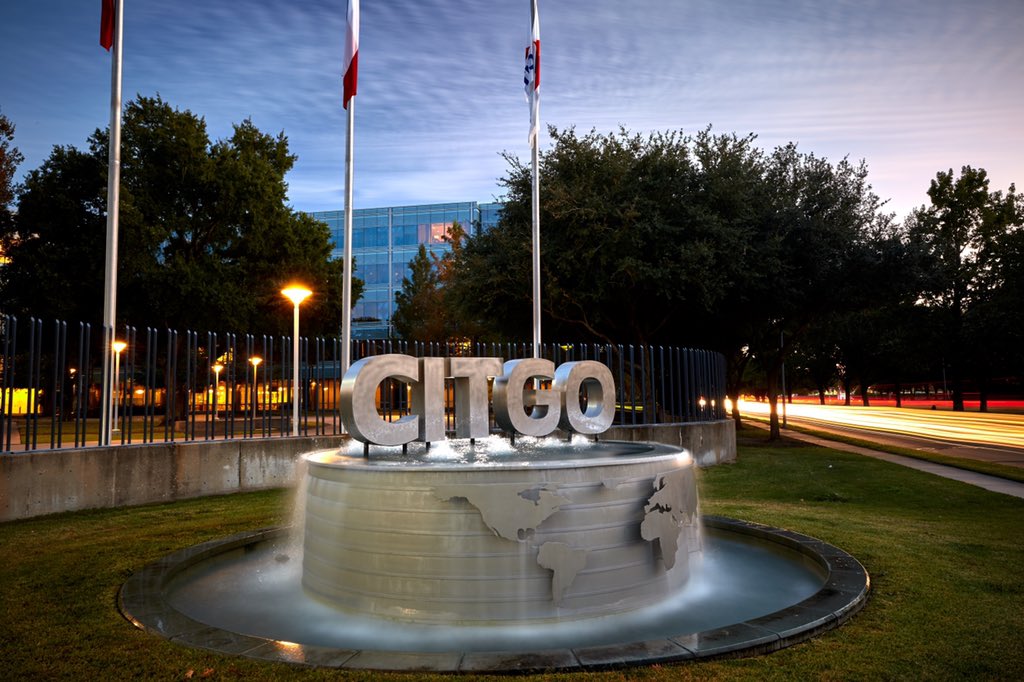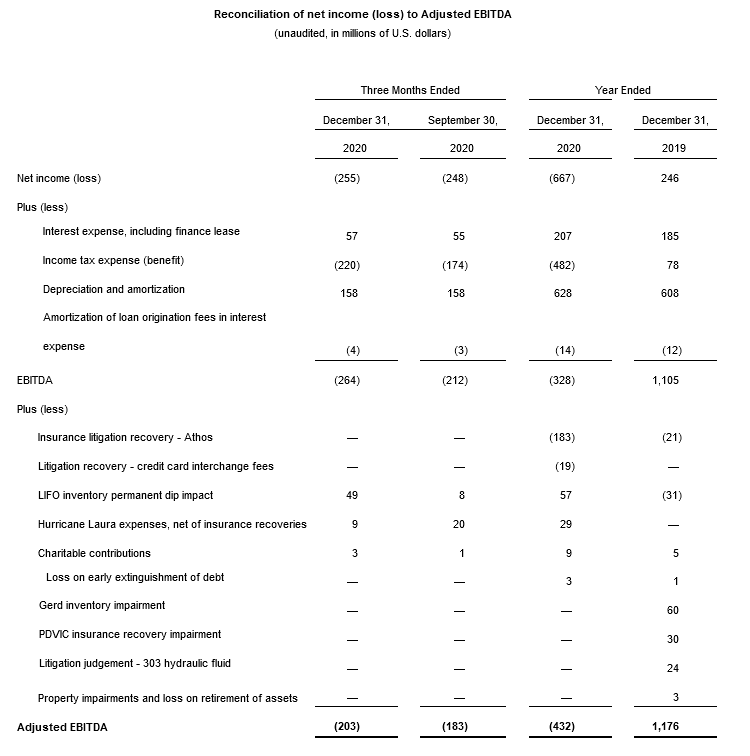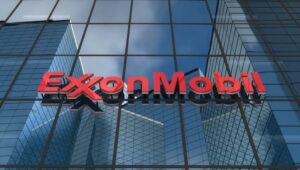
(Citgo, 7.May.2021) — Despite the unprecedented challenge COVID-19 presented for refiners, CITGO Petroleum Corporation continued to make strong progress in optimizing operational performance, aggressively managing costs and building on strategic initiatives to strengthen corporate governance, compliance and business ethics. CITGO results for FY 2020 were heavily affected by ongoing pandemic-driven market challenges affecting the entire refining sector – and the impact of two Gulf Coast hurricanes.
The CITGO Petroleum Corporation Board of Directors recently reviewed the company’s 2020 fourth quarter and annual financial results with the PDVSA Ad Hoc board. Since 2019, the new CITGO Board and management team have remained committed to transparency and are releasing publicly the company’s first annual results and performance report in nearly 15 years.
“2020 presented CITGO with a series of unprecedented challenges,” said President and CEO Carlos Jordá. “Our ability to persevere – through the COVID pandemic, hurricanes and the recent severe winter storm with widespread utility outages – and still enhance our operational performance, safety and corporate governance is again a testament to the dedication and professionalism of all our employees. Thanks to these efforts, we believe CITGO is well-positioned to take advantage of anticipated improvements in market conditions in 2021.”
The company reported a net loss of approximately $(255)mn for the fourth quarter of 2020, along with EBITDA1 of approximately $(264)mn and adjusted EBITDA of approximately$(204)mn. For the year ended December 31, 2020, the company reported a net loss of approximately $(667)mn, along with EBITDA of approximately $(328)mn and adjusted EBITDA of approximately$(432)mn.
The Lake Charles refinery was safely shutdown and restarted twice in 2020 due to the impacts of Hurricanes Laura and Delta, which struck the Gulf Coast within six weeks of each other. In both cases the refinery experienced no safety issues or hydrocarbon releases arising from the direct impact of the storms.
“The efforts of our Lake Charles employees – executing hurricane shutdown and restart procedures twice amidst a global pandemic – were nothing short of extraordinary,” said CEO Carlos Jordá.
Throughout the year, the company achieved record-setting performance in both safety and environmental. Specifically, in the area of OSHA occupational safety incidents, 2020 marked the company’s best performance over the last five years and also represented the best year ever for process safety as measured by API process safety standards. Similarly, 2020 was the best year ever for environmental performance after a record-setting performance in 2019, calculated using a combination of metrics such as overall criteria air emissions, number of reportable releases to air and water, and specific types of operational deviations.
In addition to the continued emphasis on safety and environmental performance, the CITGO Board of Directors and management team have made corporate governance, compliance and business ethics a continued priority. Important milestones in these areas were achieved in 2020, most notably the appointment of a Chief Compliance & Ethics Officer, updating the company’s code of business conduct and the issuance of the company’s first-ever ESG report.
Q4 and Full Year 2020 Highlights:
- Financing – CITGO ended 2020 with a strong cash and liquidity position, having taken aggressive steps during the year to control costs, and completed the following significant financing transactions:
- In June 2020, CITGO successfully refinanced its 2021 Term Loan B with proceeds of a private offering of 7.00% senior secured notes due 2025. The notes offering was oversubscribed, allowing CITGO to upsize the offering to $1.125bn.
- In December 2020, the company entered into a two-year $250mn accounts receivable securitization facility, providing CITGO with incremental, low-cost funding and enhancing its financial flexibility.
- Refinery throughput – Total refinery throughput for FY 2020 was approximately 638,000 barrels-per-day (bpd), including approximately 84,000 bpd of intermediate feedstocks, compared with approximately 800,000 bpd processed during FY 2019, including approximately 112,000 bpd of intermediate feedstocks. Refinery throughput during the year was affected by the continuous low-demand environment as a result of the COVID-19 pandemic, as well as the extended shutdown at the Lake Charles refinery due to Hurricanes Laura and Delta.
- Turnarounds – CITGO completed planned turnarounds at the Lemont and Lake Charles refineries after developing and implementing strict COVID-19 safety protocols, allowing the company to take advantage of the low demand environment.
- Disciplined cost management
- CITGO took aggressive steps to manage costs in order to navigate the challenging market environment, including temporarily suspending employer contributions to the company’s 401(k) retirement plan. In addition, in September 2020, CITGO modified the salaried employee defined benefit pension plan, which resulted in an approximately $150mn reduction in projected benefit obligations.
- The company reduced 2020 annual operating expenses and capital expenditures by approximately 11% and 30%, respectively, as compared to the original budget.
- Based on the estimated 2020 loss for income tax purposes the company requested a refund of federal income taxes of approximately $550mn as a result of the Coronavirus Aid, Relief, and Economic Security Act (the ”CARES Act”). The CARES Act, among other things, allows temporary increases in the amount of business interest that is currently deductible, and also allows for tax net operating losses in the 2018, 2019 and 2020 taxable years to be carried back five years.
- Exports – Exports for FY 2020 averaged 135,000 bpd, which represented approximately one-third of the company’s Gulf Coast refinery production.
- Operational excellence and awards – Aside from the effects of the hurricanes, all three CITGO refineries operated reliably throughout FY 2020. Additionally, the company achieved several safety and environmental performance records and was recognized with a number of industry awards in 2020, including:
- The American Petroleum Institute (API) awarded CITGO its 2019 Distinguished Pipeline Safety Award, the recipient of which is chosen by its peers for demonstrated excellence in safety practice, ideas, and policy.
- CITGO Lake Charles was named the inaugural recipient of the American Waterways Operators (AWO) Award for Safety.
- The CITGO Corpus Christi refinery was one of only two Gulf Coast refineries to receive the prestigious EnergyStar® certification from the U.S. EPA for 2019, and the refinery was recently notified that it had earned the certification again for 2020 performance.
- The CITGO Lemont refinery received the AFPM Elite Gold Safety Award in recognition of top industry safety performance and excellence in program innovation and leadership.
Notable personnel changes:
- Jack Lynch was appointed Chief Compliance and Ethics Officer in February 2020, reporting directly to CITGO President and CEO Carlos Jordá and with direct reporting access to the Audit Committee of the Board of Directors.
- Pablo Pérez Barreiro, Marcelo Laprea-Bigott and Carlos Jordá were all named to the CITGO Petroleum Corporation Board of Directors in July 2020.
- Also in July, Edgar Rincon was appointed Chief Operating Officer (COO) and Executive Vice President, reporting to CITGO President and CEO Carlos Jordá.
- John Zuklic was appointed Chief Financial Officer (CFO) and Vice President Finance in November, reporting directly to CITGO President and CEO Carlos Jordá.
Industry Overview:
COVID-19 and its development into a pandemic in March 2020 created significant economic disruption throughout the year, with full-year real GDP growth expected to contract by 3.5% relative to the previous year. The refining industry realized the worst of the crisis in the second quarter, as product demand and refinery utilization reached their lowest points. While recovery has been bumpy, market conditions indicated some improvements in the latter part of the year, as the number of new cases declined, some restrictions eased and vaccines emerged on the horizon. Changes in key drivers during the year include the following:
- Oil demand declined from more than 102 million bpd in December 2019 to about 96 million bpd by the end of the year. In 2021, oil demand is expected to improve, assuming efficient production and deployment of COVID-19 vaccines.
- Gasoline demand in the United States is approximately 0.91 million bpd below 2019 levels and has been there since July, reflecting ongoing reductions in “in person” school attendance, business travel and social events.
- Distillate demand, which was the least impacted by the pandemic, continued to improve since May, and the year ended with demand very similar to 2019.
- Jet fuel demand at year end remains 32% below the 2019 level and its recovery is dependent on increased air travel resulting from improved consumer confidence in travel.
- Refinery utilization in the United States remained approximately 12% below 2019 levels at year-end. With expected improvements in demand, CITGO expects utilization in 2021 to be about 5-7% below the historical seasonal range of 85-95%.
“While we remain cautiously optimistic that these key drivers will steadily improve this year as the vaccinated population continues to grow, at the same time we will continue to aggressively manage our costs and liquidity. We believe this proactive approach will better position us for additional challenges that 2021 may bring,” concluded Jordá.

The primary items affecting adjusted EBITDA during 2020 and 2019 were:
- Insurance litigation recovery – Athos (2020 & 2019): We recovered approximately $183mn in 2020 and $21mn in 2019 in insurance proceeds from the previously incurred costs related to a shipping incident in 2004.
- Litigation recovery-credit card interchange fees (2020): Proceeds received from legal settlements.
- LIFO permanent dip (2020 and 2019): We recorded approximately $57mn loss in 2020 as a result of a reduction of prior years’ LIFO layers. We recorded approximately $31mn gain in 2019 as a result of a reduction of prior years’ LIFO layers.
- Hurricane Laura expenses (2020): We incurred approximately $58 million in repair costs, of which approximately $29 million were recovered through insurance. We expect to incur additional costs, net of any insurance recoveries, into 2021.
- Gerd inventory impairment (2019): Represents a $60mn inventory write-down due to an unlawful and forceful taking in Venezuelan waters of that amount of crude oil owned by the company aboard the tanker Gerd Knutsen on 9 Feb. 2020 and the tanker’s failure to depart Venezuelan waters for approximately one year despite the company’s instructions to depart.
- PDVIC insurance recovery impairment (2019): Represents a $30mn write off of insurance receivables related to the 2006 heavy rain event at the Lake Charles refinery for coverage placed through PDVIC, an insurance entity controlled by PDVSA in Venezuela forced into liquidation in 2018.
- Litigation judgment – 303 hydraulic fluid (2019): Represents a $24mn charge for the Company’s share of industry-wide class action settlements related to tractor hydraulic fluids litigation.
1 EBITDA and Adjusted EBITDA are non-GAAP financial measures. Please see the reconciliation at the end of this press release for more information.
____________________

